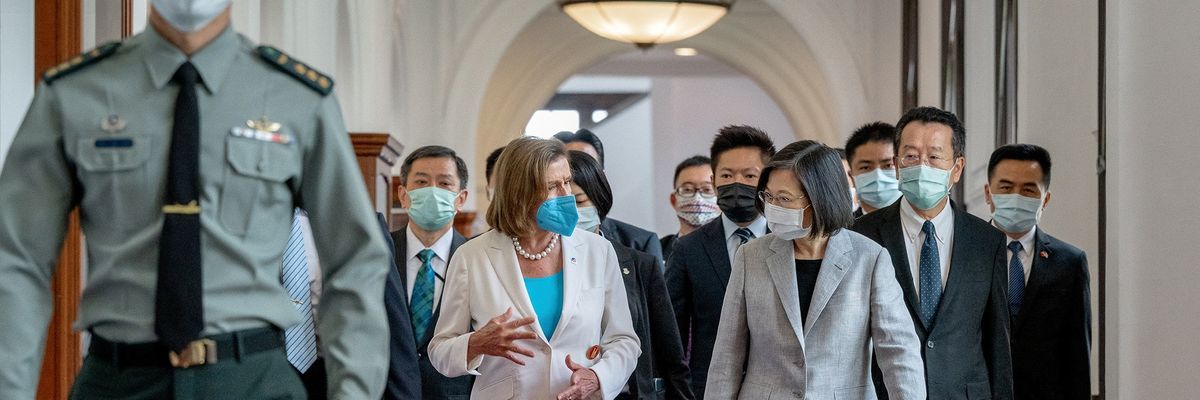“Regardless of which political party is the government, this is a long-time practice for our representative office in the US to hire public relations firms to assist us in strengthening ties with the United States,” said Taiwan’s foreign ministry spokeswoman Joanne Ou in a June news conference.
If House Speaker Nancy Pelosi’s trip to Taiwan this week is any indication, Taiwan’s advocates in the United States are earning their paychecks.
As documented in a Center for International Policy report, “The Taiwan Lobby,” which I co-authored, organizations registered under the Foreign Agents Registration Act to represent Taiwan have worked diligently to enhance political, economic, and military ties with the United States. They helped to push through more than $5 billion dollars in arms sales to Taiwan, in part by contacting the offices of nearly 90 percent of all members of Congress in 2019, according to FARA filings. This included Taiwan’s lobbyists contacting Speaker Pelosi’s office 18 times and arranging a closed-door meeting between Pelosi and the president of Taiwan during the summer of 2019.
More recently, Taiwan’s lobbyists have continued to promote closer ties with the United States. Throughout 2022, they have been lobbying to get the Biden administration to add Taiwan to the Indo-Pacific Economic Framework, including collecting signatures for a “Dear Colleague” letter from the Congressional Taiwan Caucus. Taiwan’s agents also hyped a March 2022 trip of U.S. officials purportedly "sent by President Biden" to Taiwan.
The size of the Taiwan lobby has grown in recent years, from seven FARA registrants in 2020 to twelve today, and Taiwan has spent just over $25 million since 2016 on these firms, according to the OpenSecrets website. While that might seem like a lot, it pales in comparison to Taiwan’s neighbors in the Asia Pacific region – Japan and South Korea, each spent more than $200 million, and China spent a whopping $276 million on FARA registrants during the same time period.
But, FARA registrants are just one part of the equation, as Taiwan’s influence in D.C. is also aided by close ties, and financial support, for a number of Washington think tanks. As Eli Clifton previously documented for Responsible Statecraft, many of the nation’s top think tanks, including the Brookings Institution, the Center for American Progress, and the Hudson Institute have all received funding from the Taipei Economic and Cultural Representative Office (TECRO), Taiwan’s de facto embassy in the United States. These same think tanks often push for expanded arms sales and trade agreements with Taiwan “without widely disclosing their high-level funding from TECRO,” according to Clifton.
More recently, scholars at some think tanks that have received TECRO funding have downplayed concerns about Nancy Pelosi’s controversial trip to Taiwan. A Hudson Institute scholar, for example, argued that, “Newt Gingrich proved that despite CCP sabre-rattling, the Speaker . . . can visit Taiwan if he wants to. Decades later, Nancy Pelosi proved that is still true.” Similarly, a Brookings scholar was dismissive of China’s military exercises that were announced by Beijing in response to Pelosi’s trip, telling CNBC they were just “par for the course,” and that “China exercises a lot of showmanship and exercises and shows of force in the broader Western Pacific region all the time.”
Just last week former Secretary of Defense Mark Esper spoke at the Atlantic Council — which also receives funding from TECRO — about a trip he and an Atlantic Council delegation made to Taipei in mid-July. Esper argued that the United States should militarily defend Taiwan and, just like Taiwan’s lobbyists, said Taiwan should be included in the Indo-Pacific Economic Framework.
Furthermore, when meeting with Taiwan president Tsai Ing-wen, Esper called for a major shift in U.S. policy, a move away from “strategic ambiguity,” which experts say could set up a confrontation with China. “It is my personal view that the one-China policy has outlived its usefulness, that it is time to move away from strategic ambiguity,” he said in the July meeting.
TECRO has claimed it does “not influence what experts publish; nor do we base funding decisions on what experts choose to write on,” yet, there’s a pattern of the think tanks it funds being supportive of greater U.S. ties with Taiwan. It’s also clear that Taiwan’s registered foreign agents have helped to increase U.S. military and economic ties with Taiwan. This week their efforts culminated by helping to pave the way for Pelosi’s risky trip to Taiwan. This alone should merit greater attention on the impacts this small, but clearly powerful, influence operation is having on U.S. foreign policy.
















